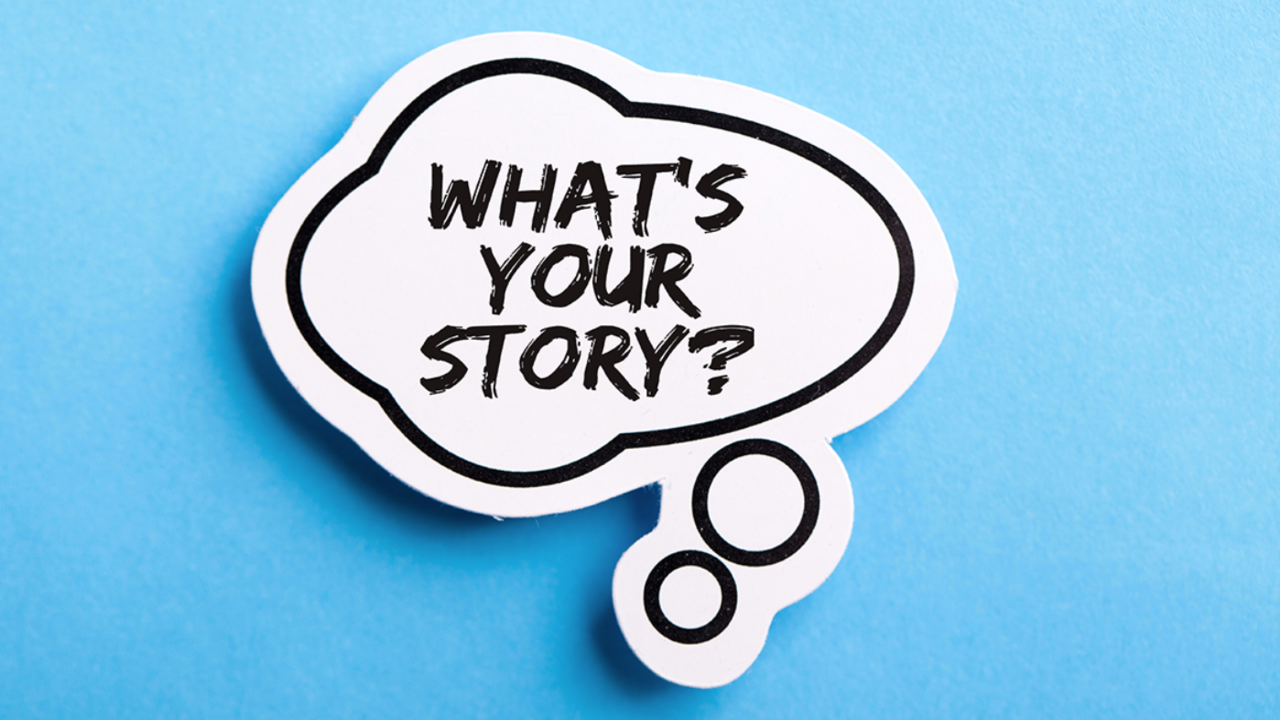Your story isn’t just your past... it’s your future

Is the story of your past serving you in the future?
Storytelling is one of the most profound traits that separate humans from other animals. From the earliest cave drawings and pre-written word oral traditions, we have striven to contextualise our lives.
The most important story however, is the one we tell ourself.
Words make worlds and the narrative we tell about ourselves isn’t just a story of our past, but a glory or gory arrow pointing us towards our future.
We can mistakenly believe we are defined by what happens to us; but the reality is, we are defined by what we think about what happens to us.
How often do you question the script you’re reading from? Is it a well-worn narrative, lines being fed to you by societal / parental / cultural / marital expectation? Or are you ad libbing, finding or forging a new voice? This is particularly important in midlife, especially now as it’s being redefined. Sculpted from an extra twenty years of life, and painted on a new landscape of unprecedented freedoms and opportunities, the script is ours to write.
The story we tell ourselves (and others) is crucial in deciding whether we have a leading role in our own lives, or merely a supporting role in the lives of others.
How does our character move in the story we tell ourselves? Responsive or reactive? What interpretation of your life, and the events within it, have you curated into the narrative you tell yourself?
These are the stories of two women over the same few years of midlife:
One woman hit 45 having not only lost her sense of identity, but her reason. After stepping back from a career that had defined her to balance the needs of her family, she juggled a freelance career while raising three kids, and caring for ill parents. After years of being unhappily married, her marriage ended when her husband came out as gay, and then her mother died within the year, leaving her reeling in the wake of grief and trauma. The events of mid-life threatened to consume who she was.
The other woman is an explorer who sees life as one long learning curve. She created a career that fed her love of words and adventure, travelling the world and helping others. She juggled the muddled demands of her creative nature and maternal nurture, and despite a number of serious challenges and setbacks, she continued to challenge herself to grow. It wasn’t always easy, but she tried to learn from every experience, and help others. She published a best selling memoir of how she learned self-care in the midst of parent-care and child-care, went back to college and graduated as a coach with a mission to provide support to women, using her own experiences and her new skills.
Both stories show a midlife mayhem in different ways. Yet of course, both women are me. One story has me as a reactive victim to circumstance, and the other has me struggling but stretching to keep myself at the centre of my own life story. I know which version has helped me move forward.
I’m not unique in having a life full of challenges, disappointments, joy, loss, gain, drain, adventure, love, hate, kindness and hardship. What makes me - what makes each of us - unique is how we see ourselves in the story of our telling.
It can take effort to change your story to make it work for you, not against you. You aren’t changing the events, but you do get to write the tone, the flavour and the colour; whether you write yourself as the victim, the antagonist, the hero, or even an innocent bystander or collateral damage.
As the psychologist and Holocaust survivor Dr Edith Eger writes in her latest book The Gift (authored at the tender age of 93), “In my experience, victims ask ‘Why me?’ Survivors ask ‘what now?’
In nearly every coaching relationship I form with a client, we begin with self-discovery. I help them look at the character at the centre of their story to find their strengths, their values, their passions, their accomplishments - not just the CV or headline achievements, but the quiet slow burns, the little victories, the big leaps of faith or fear. I also encourage investigation - with kindness and curiosity - to identify the self-limiting beliefs and character assassinations we have adopted or absorbed that taint the narrative, clouding the plot with useless distractions and obstacles.
We think our power lies in what we control, but if 2020 has taught us anything, there is little we can control but how we respond to life. Not the expectation, but the reality.
So how can we tell our story well?
Listen - How do you talk about your experiences, your challenges, your past? Do you talk as if you are unlucky, or not responsible?
Question - Ask does your story serve you? The story about your career that didn’t go to plan? The story of your divorce? How you describe yourself.
Choose - Epictetus wrote ‘it’s not what happens to you, but how you react to it that matters.’ You can’t choose everything that happens, but you can write the story by responding to whatever happens in a way that ultimately serves you.
The story we tell ourselves is as important as the events of our lives. It’s the only story we will leave behind. As the English singer songwriter Dodie writes in Monster, “A thousand words are left unsaid, ‘cause no-one listens to the dead.”
Make sure your story is told well.

